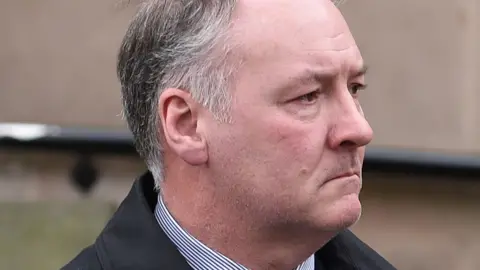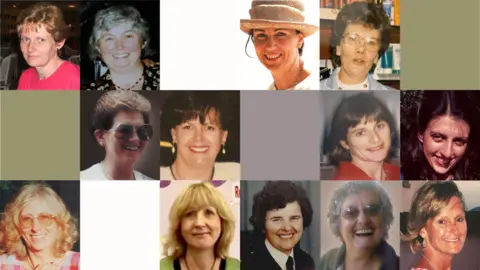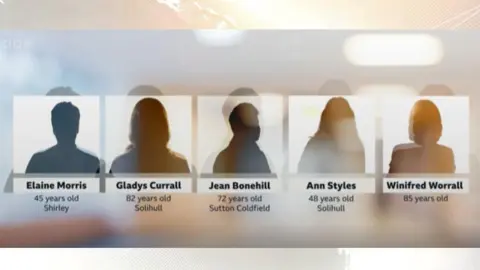Two more inquests for jailed surgeon's patients
 PA Media
PA MediaA further two inquests have been opened into the deaths of former patients of jailed surgeon Ian Paterson, bringing the total number of inquests to 63.
The coroner, Judge Richard Foster, opened hearings into the deaths of Judith Ingham, aged 60, and Pearl Tatlow, 75, on Tuesday morning.
Judge Foster then adjourned the two inquests, to be heard either later in 2025 or in 2026, and resumed a hearing into the death of Elaine Morris.
Ian Paterson was sentenced to 20 years in prison in 2017, after being convicted of wounding patients with botched and unnecessary operations. The inquests are to determine whether the women died an unnatural death as a result of Paterson's actions.
They will also consider whether any of the former patients had so-called cleavage-sparing mastectomies from Paterson, where some breast tissue was retained.
A previous additional hearing into the death of Christine Gould, a kitchen assistant from Solihull, was closed after it concluded she was not operated on by Paterson and died of natural causes.
Paterson is known to have treated thousands of patients at hospitals in the West Midlands.

On Tuesday, the inquest heard Mrs Ingham was born in Leeds and was a chartered accountant before she died of metastatic breast cancer at home in Castle Bromwich, Birmingham, on 20 March 2022.
Mrs Tatlow, a retired secretary from Solihull who had been widowed, died in a hospice in Birmingham on 28 July 2002 of carcinomatosis and carcinoma of the right breast.
Mrs Ingham's husband and a family member for Mrs Tatlow were present for the inquest openings via video-link.
After Judge Foster opened and adjourned proceedings for Mrs Ingham and Mrs Tatlow, he returned to the case of Ms Morris - one of five women for whom coroners have not yet been able to trace next of kin.

The inquest heard Ms Morris suffered from epilepsy and cerebral palsy, both of which were described as severe, and she had learning difficulties.
She also used a wheelchair and was cared for by her mother at home in Shirley, Solihull, with Paterson telling the inquest the patient's mother made decisions about her care.
Ms Morris was referred to see Paterson in August 1999 by her GP, after complaining of pain and a lump in her right breast when she was 42.
Oncologist Dr Talaat Latief, who Ms Morris had been referred to in a private capacity, told the coroner he had deemed it unsafe to give Ms Morris radiotherapy and that it was not appropriate to give her chemotherapy.
Dr Latief said he believed she would have been unable to lie still for 15 minutes each day due to her disabilities, meaning he would not be able to control where the radiotherapy beam went.
He added she was unable to be in a room on her own without her mother or another adult, which was a requirement for the treatment.
The oncologist claimed her epilepsy was another reason he could not perform radiotherapy, but Paterson later disputed this.
Dr Latief added he did not believe it appropriate to administer chemotherapy to Ms Morris due to the side effects.
"It was clearly obvious to the mother that she was not able to cope with the requirement of the treatment," Dr Latief said.
Giving evidence, Paterson said Dr Latief should have made Ms Morris's mother clear not having radiotherapy or chemotherapy could increase the risk of a recurrence of cancer.
Dr Latief said he had explained all of the related factors, but that he would not recommend surgery because he was not a surgeon and that was "not his area".
Despite Dr Latief's assertion chemotherapy and radiotherapy were not appropriate, Ms Morris was repeatedly referred back to him by Paterson and breast care nurse, Bethan Lloyd Owen.
When counsel for the inquest Briony Ballard said she struggled to see the benefit of this, Dr Latief said he agreed.
Ms Morris had a lumpectomy, but her cancer was found to have returned in January 2000. She did not have a mastectomy until November that year.
When questioned by Ms Ballard, Paterson said this could have been due to Ms Morris's mother's aversion to the operation.
"We were desperate to help this woman in any way we could," Paterson told the inquest, mentioning different treatments he said he had considered, such Herceptin.
Eventually, Ms Morris was transferred to a facility where she was given hospice care and died in 2002, aged 45.
The official cause of death was registered as carcinomatosis, where multiple carcinomas develop simultaneously, usually after spreading from a primary source, and breast carcinoma.
However, Paterson said there was "no evidence" of this, claiming another doctor had not found widespread metastases in her bones or liver.
"There's no doubt she had a fungating local recurrence of breast cancer," he said, meaning a tumour below the skin had broken through the surface to create a wound.
"But there's no evidence it had spread past the chest wall."
He also told the inquest: "I'm concerned she died of opiate overdose", adding her pain perception may have led to an increase in opiates administered to her.
"My concern is, I don't think we have a correct cause of death," he said.
The inquest continues.
Follow BBC Birmingham on BBC Sounds, Facebook, X and Instagram.
